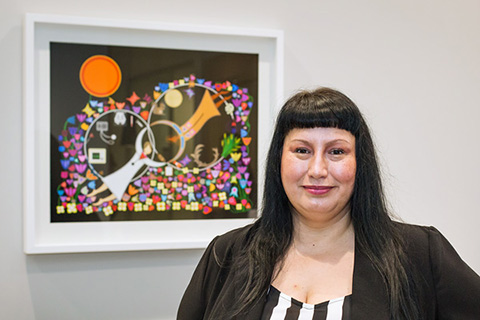In 2014, Lisa Boivin was researching an assignment on the legacy of Canada’s residential schools in an Aboriginal Studies class at U of T. She had just reunited with her biological father, a residential school survivor whom she had been taken from as a baby. “I couldn’t write about it,” says Boivin, who was adopted by a non-indigenous family, a widespread child welfare practice from 1960 to the mid-’80s. “I was paralyzed by intergenerational trauma as I learned about intergenerational trauma.” So she turned from words to images, and her ideas flowed.
The resulting digital painting, “Cutting Away Culture,” is her imagined representation of her grandmother as a child, curled up on a bed as two nuns cut off her hair. “A haircut was the first step of a continual cultural separation,” says Boivin, a member of the Deninu K’ue First Nation in the Northwest Territories and a U of T bioethics student set to complete her degree this summer.
Since then, she has continued to produce digital paintings that illustrate Canada’s historical relationship with indigenous people. Boivin creates her paintings by using her finger on a mouse pad like a brush on a canvas. She always starts on a black canvas, symbolizing colonial violence, and then paints vibrant flowers, fruit, animals and human figures on top to highlight the resilience of indigenous culture.
Boivin also uses her art to illuminate bioethical issues that arise in clinical care ranging from stereotyping, to the conflict between bioscientific medicine and indigenous teachings. “There are certain stories that cannot be confined in the structure of printed words,” says Boivin.
Though many of her works contain stark images of racism, her aim is to spark both reflection and reconciliation among health-care professionals, academics and indigenous peoples. “Understanding the lingering oppressions of colonialism will help to build safe clinical relationships between practitioner and patient,” she says.
Boivin’s work appeared on the cover of Ars Medica, a journal that explores and examines what makes medicine an art. Her painting “Sharing Bioethics” is on display at the Faculty of Medicine. She is also a guest lecturer at the faculty, showcasing her art and the issues it raises for doctors. This fall she will begin an arts-based thesis in the rehabilitation sciences master’s program, exploring indigenous perspectives on disability, which will include a critique of colonial practice, thought and diagnosis.
Though her love of drawing and painting started in childhood, Boivin says racism stifled her creativity for a long time. “I wasn’t able to fully develop that part of me until now.” She has no formal artistic training. “My painting stems from the knowledge of the ancestors. It is a translation of the beauty and resilience of indigenous peoples and cultures.”
Watch: Boivin’s TEDx lecture about her paintings






